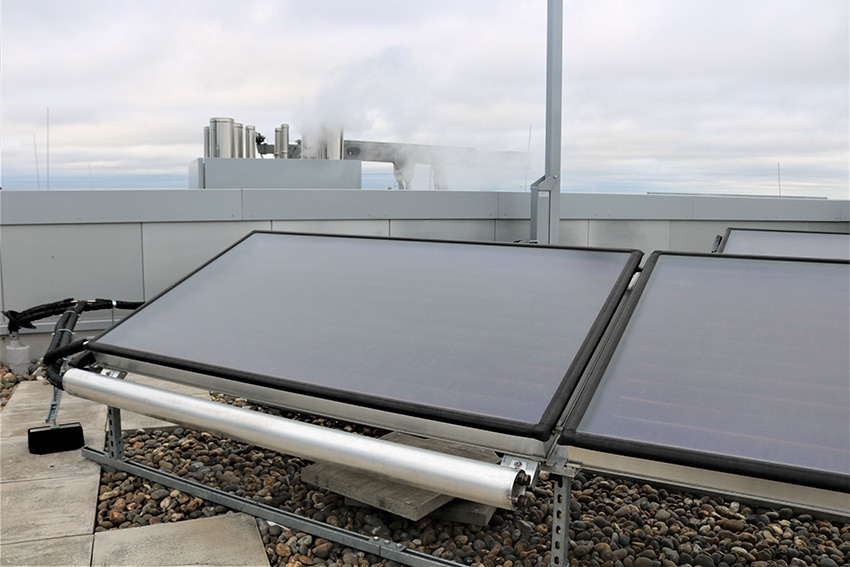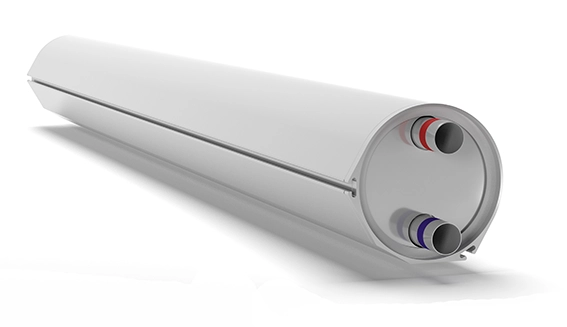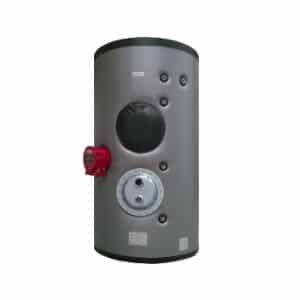Adveco Solar Thermal
Designed to support commercial buildings which use large amounts of daily hot water, solar thermal will be a valuable addition to any new build hot water application as well as an ideal technology to address decarbonisation goals for existing properties with gas connections.
It is important to realise that solar thermal systems alone will typically not generate a business’s total energy requirements to meet the year-round demands for domestic hot water (DHW). For this reason, the optimal application for solar thermal is to supply pre-heated water into the DHW system. Correctly designed and sized, the solar thermal system can then generate a substantial proportion of the hot water requirements, enough to reduce reliance on the gas or electric boiler, especially during summer months.
Solar thermal also lends itself to working in conjunction not only with other conventional heating technologies but also with the latest generation of renewables, in particular heat pumps. This can be of great advantage to a business, reducing carbon emissions and lowering energy costs to advance sustainability strategies today.
Depending on the building and energy consumption habits, solar thermal will typically provide at least 30% of the annual hot water demand.





Features & Key Technologies
- Proven renewable technology
- High-efficiency flat panel design
- Intrinsically safe drain back system
- Reliable, low maintenance with assured system longevity
- Smaller footprint than PV for equivalent thermal generation
- Ideal for renewable applications with large roof area and predictable hot water demands
Options
Solar Thermal and Gas Water Heating
Solar thermal preheat for buildings with an existing gas connection which rely on large amounts of domestic hot water (DHW).
Solar thermal pre-heat, followed by gas water heating to ensure peak demands are met.
Reduces demand on gas-fired water heating to conserve energy. reducing emissions and operational costs.
Basic System Elements:
- Flat plate collector
- Drain back module
- ATSI stainless steel cylinder
- ADplus water heater

Solar Thermal and Electric
Solar thermal preheat with electrical water heating for new build and gas replacement projects which rely on large amounts of domestic hot water (DHW).
Solar thermal pre-heat with electrical water heating to maximise efficient hot water generation and meet peak demands.
Low carbon (in line with grid electrical supply) system and helps control operational costs associated with electric-only water heating.
Basic System Elements:
- Flat plate collector
- Drain back module
- ATST twin coil stainless steel cylinder
- ARDENT electric boiler
- Optional backup electric immersion for added system resiliency

Solar Thermal, Airs Source Heat Pump and Electric Water Heating
The Air source heat pump’s (ASHP) coefficient of performance (COP) is maximised by preheating the cold supply to 40°C. Solar thermal provides a second-stage preheat raising water temperatures to at least 50°C. The electrical water heater is used to meet the final required operational temperature of 65°C and ensure peak demands are addressed.
For new build and gas replacement projects with large DHW requirements seeking to maximise carbon reduction and lower operational costs.
Basic System Elements:
- Flat plate collector
- Drain back modules
- FPi-32 air source heat pump ASHP)
- ATSH stainless steel cylinder
- ATSTI stainless steel cylinders
- ARDENT Electric Boiler
- Optional backup electric immersion for added system resiliency


Download The Adveco Solar Thermal Brochure
The Adveco Solar Thermal handbook provides you with a quick and easy reference guide to proven, easy-to-maintain, low-carbon hot water for commercial buildings.
Featured Case Study: The New Benchmark In Sustainable Building
100 Bishopsgate is the latest prestige construction project in the financial district of the City of London. Operated by Brookfield Properties, the development is a stunning all-glazed tower offering 37 floors of mixed-use that has been designed and constructed to meet the highest standard of efficiency, achieving an ‘Excellent’ BREEAM rating to maximise sustainability and reduce the carbon footprint over the lifetime of the building.

FAQs
Faced with an increasing expectation to become more actively sustainable, as well as mitigating rising energy costs, commercial organisations need to give greater consideration to the integration of a solar thermal heating system as part of their premises. Not only a proven and extremely reliable technology, solar thermal offers a clear path to reducing CO₂ emissions.
Correctly designed and sized, the solar thermal system can generate a substantial proportion of the hot water requirements, enough to reduce reliance on the gas boiler, especially during summer months. This alone can result in considerable savings in the overall energy overheads of the business.
This panel is deliberately left hidden.
Before committing to a solar thermal system, it is vital to consider a wide range of factors. Besides maximising the efficiency of the appliance, it is equally important to have a sustainable and ecologically sound installation. We have stated how solar thermal systems are ideal for organisation that use and rely on large amounts of hot water (restaurants, hotels, schools, hospitals and larger offices), but it is important to understand that a solar thermal system will not fully replace your existing water heating system and will not provide space heating. The actual percentage of your water heating demand covered by solar thermal will depend on your site and energy consumption habits (though this figure is typically around 30% for commercial sites). A south-facing and unobstructed roof with an inclination of 30° from the horizontal is optimal, though by no means essential as Adveco solar collectors can be installed in a variety of ways: built on roof; built in roof; mounted on walls or on frame construction to achieve inclination on flat roofs.
All areas of the UK are suitable for solar energy technology; however, even minimal shade can greatly reduce a system’s output. If a solar thermal collector suffers significant shade coverage, then the technology will not be applicable and a commercial air source heat pump, such as the Adveco FPi range, may be a preferred option to produce low carbon heat. Assuming the location exhibits no shade issues, Adveco’s application engineers will assess a building’s hot water demand and calculate the number of collectors and size of the storage vessel to correctly size an application.
Solar thermal systems are most productive in the summer months, when there is most sunlight, resulting in the additional need for non-renewable energy sources during the winter months. Despite this sustainability is more than achievable, and Adveco will package the appropriate technology.

As with any water heating system, every application is unique and this demands a bespoke approach Especially when it comes to correctly sizing the solar thermal system, which will ensure the design is optimised for the application and will therefore operate efficiently.
First, a correctly sized system will consider the daily usage and peak demands. Its aim is to serve all peaks from storage, with the size of the peak determining the size of pre-heat. The recovery time for peaks is what ultimately determines number of collectors a building requires.
Second, the design process needs to size usage with available space. So, sizing considers whether the site is flat, pitched or vertical and the type of construction, its direction and shading. Length of pipe run is also important, if collectors are located a considerable distance from the plant the system’s thermal losses could be significantly detrimental to efficient operation.
Together this enables the calculation of the Solar Fraction – the total annual heat for hot water compared to the total available from solar inputs. To this is then added the details of other energy heaters (electrical or gas) that are to be used to fully visualise the completed system.
For buildings already on gas and that rely on large amounts of domestic hot water (DHW) – a large proportion of current commercial UK properties – solar preheat is the preferable option. Depending on the building and energy consumption habits, solar thermal will typically provide around 30% of the annual hot water demand.
If electrical costs can be offset by adopting solar thermal pre-heat and a gas water heater to meet peak demands, then the numbers can be very favourable. A ten-year return on investment becomes very achievable and the property gains undisputed carbon and cost savings.
Such hybrid approaches are unavoidable for commercial projects seeking a path to low-carbon hot water and is the most sensible, practical, and cost-effective option. By using solar thermal with gas after heat, commercial organisations can actively drive sustainability and retain control of operational expenditure for decades to come. With the hydrogen policy to be confirmed in 2026, retaining gas in existing commercial buildings keeps options open and future-proofs a building for other emerging heating technologies.
For new build properties without a gas connection, solar thermal still offers an opportunity to reduce an application’s annual energy demands by 30%, and thereby reduce the currently more expensive than gas operating costs.
This hybrid approach can be extended with the inclusion of air source heat pumps to provide initial pre-heat to the system cold feed. Operating at lower temperatures maximises the efficiency of the heat pump, reducing electrical operating costs and raising working flow temperatures from 10°C to 40°C. This is not hot enough for commercial applications, so the pre-heated water is then passed to the solar thermal system. essentially free to operate, the solar thermal system boosts the working flow temperatures from 40°C to at least 50°C. During summer months it is possible for the solar thermal system to deliver the necessary 60°C+ working flow for safe provision of commercial hot water.
To ensure safe, consistent and necessary high operational temperatures, the water then passes to an electric water heater. In most cases, Adveco will now recommend one of the variant compact FUSION E water heaters where final consistent water temperatures of 65°C are assured 24/7 year round. The application of an immersion backup in the FUSION Eplus variant offers further system resiliency for organisations that deem consistent hot water provision to be business critical.
 Adveco Flat Plate Solar Collectors provide a number of options for installation on the roof, in the roof and on a building’s facade. For further information visit the Solar Thermal Collectors page.
Adveco Flat Plate Solar Collectors provide a number of options for installation on the roof, in the roof and on a building’s facade. For further information visit the Solar Thermal Collectors page.
Adveco specialises in design for solar thermal and can support and provide recommendations for your installation needs.
For installers wishing to offer solar thermal services, Adveco provides installation training via CPD and onsite instruction. To arrange training please visit our Solar Thermal CPD page.
Related Products
Adveco Drainback Systems – For Long-lasting, Low-Maintenance Renewables

Adveco Solar Thermal Flat Plate Collectors To Reduce Energy Demands,
Costs & Carbon Emissions

Why Choose Adveco

50 Years
Adveco Ltd. is the independent hot water specialist for the commercial built environment and has historically traded as A.O. Smith Water Heaters in the UK.

Highest quality products and services
We prioritise our clients’ needs to deliver bespoke, practical systems.

Full aftersales support
Maintenance and service packages, commissioning, spares, warranty and technical support for your application.






















